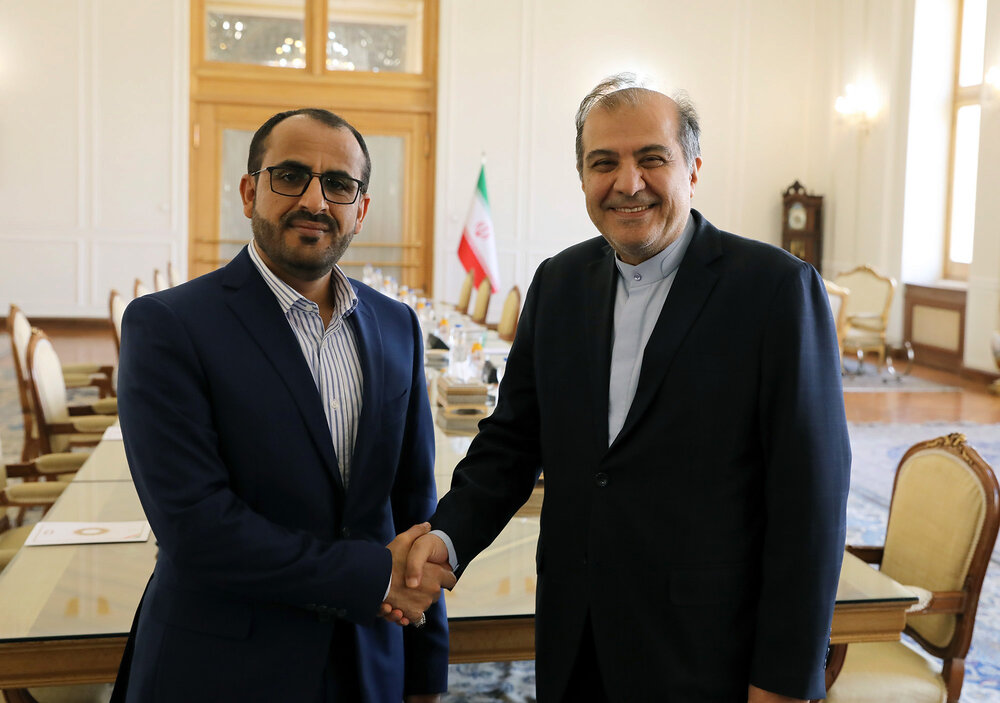Ansarullah chief negotiator meets Iran’s Khaji

TEHRAN— Mohammad Abdul Salam, spokesman for the Yemeni Ansarullah movement and the head of the negotiating team of Yemen’s National Salvation government, met in Tehran late on Saturday with Ali Asghar Khaji, a senior advisor to the Iranian foreign minister for special political affairs.
During the meeting, the two sides held consultations over the latest developments in Yemen.
Khaji expressed pleasure that the truce in Yemen is still in place. He also voiced hope that the ceasefire will pave the way for the unconditional removal of the Saudi-led blockade on Yemen for a nationwide cessation of hostilities as well as political dialogue.
The top negotiator for the Yemeni National Salvation government thanked Iran’s political and humanitarian assistance for Yemen and its people.
Abdul Salam further briefed Khaji on the process of the implementation of the temporary truce and the prospects of developments in Yemen.
He pointed to the current attempts to hamper proper fulfillment of obligations, saying it is necessary that the other side follow through on its commitments, remove the siege on Yemen, stop the war and pay salaries to employees.
Prior to the meeting, the Ansarullah official met Iran’s Parliament Speaker Mohammad Baqer Qalibaf.
Qalibaf said that Iran fully supports the independence of Yemen and the Yemeni-Yemeni negotiations and considers this a religious and humanitarian duty.
“Of course, I did not have the opportunity to visit Yemen closely, but the series of reports and scenes that can be seen from there show the spirit of jihad, resistance, martyrdom and self-sacrifice among the Yemeni people and the Yemeni Mujahideen,” Qalibaf said.
He added that the events in Yemen are very similar to the events of the Islamic revolution in Iran, saying, “Our friends in the countries of the axis of resistance did not face the problem of managing the country at the beginning of the work, but we and you had to manage the country and we had to manage the war from the beginning of the work.”
Qalibaf referred to the early days of the victory of the Islamic Revolution, stating that “after the victory of the Islamic Revolution, America and the Zionist entity [Israel] believed that they would defeat us and defeat our revolution in a short time, so they entered the military stage,” according to Al Alam.
He added, “Based on this scheme, at the beginning of the victory of the Islamic Revolution they waged a long and exhausting war (in the 1980s), and with the passage of time more pressure was imposed on us, and they assassinated a number of members of the parliament, the head of the judiciary, the Prime Minister, the President and many people including women and children in the streets to create conditions critical to the Islamic Republic of Iran.”
Qalibaf noted, “Despite the crises that the enemies created for us, the spirit of struggle and revolution of the people and Imam Khomeini (may God be pleased with him) as a great leader of the revolution made the people go through these difficult conditions and achieve victory.”
He added, “Of course, our enemies, especially America and Israel, have changed the way they fight with Iran and waged economic war with the aim of weakening the culture and spirit of jihad and martyrdom among the people.”
Qalibaf referred to the developments in Yemen during the past eight years and said that the Zionist entity, the United States and Saudi Arabia believed that they would succeed in bringing the Yemeni people to their knees within 3 months, but they did not realize that the morale of the Yemeni people is like the conditions and morale of the Iranian people during the Islamic revolution.
“We can defeat the enemies on the resistance front as long as we are able to generate force, and if this occurs, it can be fruitful for us, because the Zionist entity and America only understand the language of force. I am not talking about military warfare only, but I mean the production of force in all its dimensions in such a way that the enemy is forced to withdraw.”
The spokesman for the Yemeni movement, in turn, said, “As you know, Yemen is in a very difficult situation, suffering from a fierce war; in these years the Islamic Republic of Iran has taken a wise attitude towards the Yemeni people.”
Leave a Comment